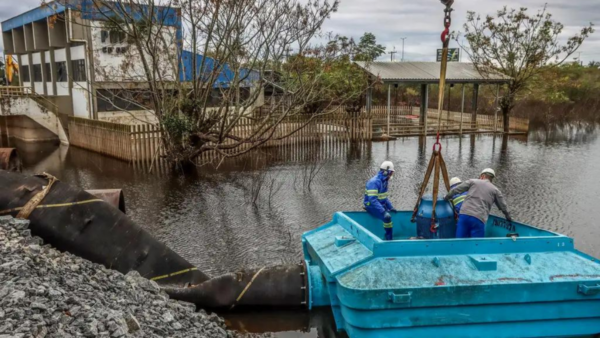The Brazilian economy has posted good numbers: GDP growth has beaten or at least met expectations quarter after quarter. Inflation still hovers within the government’s target band. Unemployment is at a decade-low, and workers’ incomes are on the rise. And still, markets are going haywire about Brazil. The Brazilian currency, the real, has crashed by more than 12 percent since the beginning of the year, and the stock market is down by double digits.
What’s happening? Why are investors dumping Brazilian assets and making a run against the Brazilian real? That’s what we’ll discuss in this week’s episode..
Listen and subscribe to our podcast from your mobile device:
Spotify, Apple Podcasts, Google Podcasts, Deezer
This episode used music from Uppbeat and Envato. License codes: Investigation by VensAdams (RBCZH7A), Aspire by Pryces (B6TUQLVYOWVKY02S), Marimba by GentleJammers (UR7J54DYH8), and Hip Hop Lo-fi by Feetmusic (HANUE6Z).
Background reading on the Brazilian currency:
- The Central Bank held Brazil’s benchmark interest rate steady at 10.25 percent last week. The bank’s Monetary Policy Committee’s inflation expectations for 2024 and 2025 increased, suggesting high interest rates for longer.
- Analysts expected the Brazilian currency to strengthen this year, but it has been crashing since the beginning of 2024.
- Now, the median forecasts for the year-end benchmark interest rate and inflation index have worsened, as has the projection for the country’s economic growth in 2024.
- Market jitters have a particular backdrop: a dispute between the government and central banker Roberto Campos Neto. President Lula has said, on multiple occasions, that Mr. Campos Neto is working “against Brazil” and that he has a political agenda to benefit potential right-wing challengers.
Do you have a suggestion for our next Explaining Brazil podcast? Drop us a line at [email protected]
Don’t forget to follow us on X and Facebook.
Transcript by Cockatoo
The Brazilian economy has been posting good numbers. GDP growth has beaten our at least met expectations quarter after quarter. Inflation still hovers within the government’s target band. Unemployment is at a decade low and workers’ income are on the rise. And still, markets are going haywire about Brazil. The currency has been crashing by over 12% since the beginning of the year and the stock
market is down by double digits. What’s happening? Why are investors dumping Brazilian assets and making a run against the Brazilian health? We’ll delve into that this week. My name is Gustavo Ribeiro. I’m the editor-in-chief of the Brazilian Report.
This is Explaining Brazil.
Reporters live off coffee.
Our biggest enthusiast is definitely a reader called Carson Allen who has made multiple donations of dozens of cups of coffee at a time and recently donated 25 of them to us all at once. Carson, thanks a lot and everyone else, be more like Carson. supporter, Gigi Candler, did just that and also sent 5 cups of coffee our way. Gigi, thank you so much!
So if you like our podcast, be more like Gigi too! And you can also subscribe to our Buy Me A Coffee fan page, pledging a monthly contribution to our newsroom in exchange for exclusive content that you will not find anywhere else. Our Buy Me A Coffee subscribers are Wild Rice, Jaceada de Oliveira, Carson Allen, Gabriel Luca, Andrey Novoseltsev, Penn Ludvig, Leslie Seo, Mark Hillary, Luis Hentz, Aaron Menez, Aaron Berger, Kars Vresnik, Alistair Townsend, Miller Renacido, Peter Abrahamson, David Dixon, José José Stankiewicz, Emerging Market Muser, Ana Land, Peter Suffring, Anderson
da Silva and someone who chose to remain anonymous. But if you like independent journalism like they do, you can go to buymeacoffee.com slash
Today we have the pleasure to welcome back Mário Sérgio Lima, a senior Brazil analyst
at Medli Global Advisors and a columnist for the Brazilian Report. Mário, thanks for being with us this week. And to start our conversation, I’d like to ask you to summarize how did 2023 go for the Brazilian economy and how much of the blame for the shortcomings or the merit for the successes does the Lula administration have considering it was in its first year of a four-year term?
And what about 2024?
Well, in 2023, the Brazilian economy really did way better than expected. I think that there was a lot, usually the first year of a new government, since the budget that’s approved comes from the previous government, you should rarely give the full compliments to a good result or the blame for a bad result to the incoming president. But if you remember in 2022, the transition government after the election, they managed to pass some changes in the budget,
some very big increase in spending. So I mean, that was really very important to work on the supply side of, or on the demand side of the economy. And that, by virtue of that, I think, like, the government really had some role in activity last year. So, I think, like, for this year, as you remember, we had like a big spike also in the first quarter of the
year due to agriculture recording very good results. Economy kind of slowed down by the end of the year, but we also saw activity coming better than expected in the first quarter this year. And then you can also put some measures that the government took as very relevant. I would mention, for instance, the payment of the precatórios, which are debt, that judicially court-ordered debt, the government paid up front last year. So that really helped a lot of, especially household indebtedness to reduce its level
and also that boosted activity and retail purchases this year. So I think, I mean, there’s a lot that the government’s doing. There’s a lot of government’s push. Even if the government is not really spending too much with all of those measures, you could see that the government has aided this economic recoactivity boost. Having said that, we are in a moment where Brazil may feel the loss of support, especially in global
markets, in the moment where people really need to understand whether we will have a sustainable trend for the public accounts, which I think is the main challenge that the government has to tackle moving forward this year and the next.
Now, Edu, last year the government passed a fiscal framework which was advertised as as an instrument to tame the deficit while also making room for real growth and investments and raises to the minimum wage, to social spending. But the ink on the fiscal framework was barely dry when the government tried to move the fiscal goalposts, asking for a laxer primary target for 2025. Also, some government officials have hinted about the possibility of a similar move this year,
even if that is a slim possibility, right?
I think that there’s a slight difference between the locals and the foreigners regarding their expectations because I think the foreigners were much more inclined to give a pass to Lula rather than the locals. I think that there is some somewhat of a ideological bias in several investors in Brazil, but there’s also like the concerns that Lula,
people weren’t sure if we were seeing the same Lula from his first government, or if we were seeing a continuation of Dilma Rousseff that like really overspent too much of fiscal policy to the point that we didn’t have any… the push was inefficient to help boost growth, but the depletion of the public coffers meant higher inflation pressure.
So I would say that there were concerns with that, and I think like the concerns reduced a bit when they passed the fiscal framework. Everybody was concerned that the fiscal framework could be insufficient. But I think like if there’s one merit is that the government really tried to not do the fiscal adjustment only on the side of expenses but also looking at revenue, which for previous governments weren’t taking enough attention.
But having said that, I would say that today we are in a moment where all of the uncertainty, the fiscal uncertainties that Brazil has, are piling up and people are concerned that even the fiscal framework will be unattainable if we keep on the same trend. Because so far the government has been really, really opposed, especially Lula, opposed to actually do some spending slash measures. And maybe the growth of revenues, it’s probably reaching, we’re probably getting to a point where it’s not going to
be growing exponentially higher to allow, to accommodate for those expenses. And you have to consider that some rules updating sometimes of expenses, they do not have the same rule as the fiscal framework. So, for instance, health and education expenses, they have their own way of being upgraded from one year to the following, which tends to be at a faster pace than the general expenses. What that shows you is that at some point, the room to do any sort of maneuver will be non-existent because all of the expenses, those expenses
that I mentioned, also like pensions, that we really spend a lot of pensions, those are obligatory expenses. So those are earmarked obligatory expenses and the government can’t just say, okay, I’m going to cut on this without doing some sort of real reform that needs to pass Congress, changing some regulation. So I think we’re in a situation where people are, again, really, really discrediting the government’s push for fiscal consolidation. And that is very bad because as soon as the government doesn’t have credibility,
people will start allocating money elsewhere. And it’s like it becomes kind of a self-fulfilling prophecy in which people expect that the government’s losing control. That means inflation is probably going to grow higher and the prices start growing higher and that means the central bank needs to be even more restrictive in its monetary policy, meaning higher rates for longer. So that also hurts activity.
At some point, Brazil is almost in a crossroads in which if we don’t take the necessary steps in the next coming month, we may be left out of the supposedly global bonanza of liquidity that we’re going to have when the Federal Reserve, which is the U.S. central bank, is going to finally start cutting rates. So I think like we are, we really need to do our homework better and faster if we, or else we may lose the window of opportunity. Now, Lula’s fiscal framework is predicated on raising revenue, which is by cutting tax waivers.
According to a recent assessment of the Federal Accounts Court, Brazilian tax waivers amount to close to 5% of GDP. And I mean, most of these benefits have no proven effect on developing the country or increasing employment. It’s more of a free lunch to corporations. But does the government have the political muscle
to cut down these waivers? And yet, does the government have the political will for that? Because while Lula said last week that he was appalled by the sheer amount of waivers, many of them were created by his party.
And meanwhile, Congress has recently hurt the government’s finances by extending payroll tax exemptions to 17 sectors, a benefit that was originally aimed at fostering jobs, but that has failed miserably to reach its goals. In my recent talks with members of Congress, I do believe that some of those measures,
a relook into some of those tax benefits and tax exemptions, could be possible, but the government really needs to send something in terms of cutting expenses before the Congress may feel the urge of giving more votes. Because I mean, it doesn’t matter whether it’s cutting expenses or raising taxes. you’re basically doing unpopular measures. So the thing is, at some capacity,
I think like businesses, in a way, they are now really prepared to lobby against the government in the Congress. And it’s not only that their lobby is strong, but also the government’s rather weak in Congress, because you really don’t have majority there. So it’s a very difficult situation, because the Congress is not really very, very interested in helping the government has its fair share of the burden
in taking those measures. Usually, I would say that here in Brazil, politicians would most likely only move with the sense of urgency that’s required once they can feel a real political backlash of market expectations worsening. And like the easiest way of that happening
is whether the Brazilian real starts to really underperform compared to the dollar because there’s a general consensus among population that a weakened currency is probably linked to poor management, poor handling of the economy. So I think that that would make them be having a bigger sense of urgency. But I mean, regarding the tax exemptions, there are loads and loads of them that are
those that are really not, that you really can’t justify anymore. Do you have some benefits like for instance, there’s a free, almost like a tax haven zone in Manaus, which is in the north part of Brazil, and you just can’t remove those tax benefits, which at some point they may have had since, but it doesn’t anymore.
There are lots of companies that use this as their own tax planning, meaning like they produce all around Brazil, but they account for the production only in Manaus so that they can pay less taxes. There’s other types of tax systems and brackets which are not, which should be considered in terms of changing the regulation. But it’s really becoming very difficult to pass this because, and this is true in every country. People do not want to pay more tax. So if they feel like their lives are being consumed by higher taxes, I think the popularity of the government will drop even more.
So it’s a difficult balancing act. But there are some things that need to be done, and some things that need to be done in the short term, but also in the medium term to make the public indebtedness level sustainable, which is fundamental for Brazil.
And Mario, currency woes are not just bad for the people whose salaries are in reais and who wants to travel abroad.
They do have a significant impact on inflation, right? It may not be like a one per one, but it does have impact. And I mean, it’s not just bad for people that are going for imports of goods, you know, like maybe some prices in the supermarket will be higher because of the weakening of the real weakens, like oil prices become more expensive for the Brazilians, so Petrobras may need to pass through some of the price increases to consumers that can
affect food and commodities prices, and also the importing of goods, industrial goods. But I think like there’s a, why, I mean, for exporters, Brazilian exporters, and Brazil is a huge exporter, grains, oil, and other raw materials, especially, a weakened currency is actually better.
I mean, they make more money and they can like boost, boost, they can hire more people, they can increase investment. So I think like, it can have a beneficial side to it. But also, but for other types of economic activities, especially like industry, when you probably need to import a lot of capital goods, for instance,
to renew your factories, it becomes really, really expensive and this can also hurt investment. So, I mean, I would say that in general, the net result of a severe weakening of the real is negative. But I think like more than just like the real impact of that, I would say that there’s a political narrative
should be constructed for this kind of currency, currency levels, which can go very bad for the government. So if people start to consider, and like for instance, even if there’s not a direct link, but if people start saying, hey, you’re paying more taxes, and even so that the real is weaker,
so it’s like the government is taking money to do corruption, to do something else and not really doing something to improve your life. So I think there is a political rhetoric which I think in this case, that’s why I would say like the Brasilia would be hard pressed to find a solution if the Brasil Real really weakens because let’s just assume that one of the effects is the Ibovespa, the Brazilian stock index plunging.
At some point, you know, like it’s still, even if more people are investing in the stock exchange, this is not something like it is in the US, where everybody invests. So if the stock exchange is doing poorly, it’s almost like your savings are reducing size
and the economy is worsening. I mean, if the Ibovispa just dropped, I mean, technically most people would associate, oh, rich people are losing money, that’s not my problem. I’m not saying that that’s the case, in the same, as political rhetoric goes.
If like, for instance, the swap DI curves, which is the expectation of the future rates, start to go up. This will affect bank loans, but it’s not going to make this kind of direct connection. But when the currency is weaker, people do that connection. can really show people that the government’s in the wrong direction. So I think that’s probably what will need to happen to actually force a quicker solution
from politicians.
What I think is interesting here is that markets were displeased by Fernando Haddad’s nomination as finance minister in late 2022 and now they are displeased about the fact that they think Haddad is not empowered enough within the administration.
What’s going on there? You can talk to anybody in markets and people would say that Haddad is a pleasant surprise, because at some point it seems like Haddad is the one guy there that’s actually holding the fort against the barbaric invasions. So I If he loses support from the government, he is almost like, I mean, we are defenseless against this sort of attack.
I mean, I can tell you by experience that being a finance minister is kind of like having this hold the fort role because you’re the one responsible to say no to the demands of everybody else. So I think Adage is really playing this part, and Adage has been understanding that expectations, in the economy, expectations matter.
So if you, what may be difficult for politicians to understand is that when the future, the expectations are worsening, like I said earlier, it’s going to be a self, it’s gonna be a self-fulfilled prophecy, because I mean, the data is probably gonna worsen afterwards. So it’s not like, oh, but we have been having steady growth better than expected.
We are having lower inflation than expected. I mean, it can really turn to the upside, this current situation, because at any rate, as Lai said, the data, the economic data that we have represents a reading from the past and not from the future, of course. So it’s concerning when the expectations are all over the place. And I think that’s something, Haddad understands this,
but I don’t think he has been able to fully put Lula seems to be more stubborn this time. He seems to be less patient for a lot of things to work out. And he’s also concerned with his own popularity. So I think this is a very bad combination when you have to embark in some unpopular measures. Maybe they lost the room to do the nasty business in the first year of government. So it always becomes harder and harder
as the years of government progresses and people are starting to look to the day after the 2026 elections, rather than who currently holds the power. And this fiscal concerns have also another side effect, right? The central bank is telling us that it will keep interest rates higher for longer.
They are currently at 10.5 percent. And according to the minutes from the last policy meetings, it could go up in the near future. How do high borrowing costs hurt the Brazilian economy? I think like higher interest rates will hurt the government and the economy in two ways. First, I mean, if you make the cost of money, the cost of money higher, it means that there’s
going to be less money in your route. The idea is you increase rates or you keep them higher for longer if you really want to reduce liquidity in the economy, if you really want the cost of the money to be higher. So of course that plays an effect on investments, for instance, if companies are finding it or more expensive to get loans, basically they are not going to invest. And not investing is almost like the first thing you do
before you start cutting costs, which in a lot of ways may come from firing people. So unemployment is supposed to also rise in the moment of tight and monetary policy. But there’s also another perverse effect of higher rates that people usually do not remember is that Brazil’s debt is linked to the benchmark interest rate, which is the CELIC rate, and
also inflation. So another, I mean, it can be linked to other indexations. I mean, it does affect the index, the prefixed bonds too. So what I’m saying is that Brazil’s, not only you have high debt, but the debt is very expensive because the rates are higher. So it’s like, it’s not like you have a, it may be like counterintuitive because you think, okay, I mean, that’s the cost. But since you actually do not have, you do not collect enough money to pay your debt, you’re basically paying the interest on it. So it drains resources that could be used for, even if like not directly,
but theoretically resources that could be used to improve the fiscal, disorganized fiscal policy will create an imbalance in the economy that will raise inflation, which thus forces the central bank to increase rates, and then it worsens the fiscal policy. So I think like this is a vicious cycle,
and Brazil really needs to break this vicious cycle. And this is what the central bank is saying. I mean, the central bank is basically letting it clear that they do not plan in the short term to cut rates anymore. I still have two cuts by the end of this year, but mostly because my colleague that covers
for the feds, like I mentioned, the Federal Reserve in the US, believes they start cutting this year and has two cuts, so that can create an economic scenario in which the bassein can cut two more times. But basseins trying to tell you that they are not planning on cutting. They are still very far from saying, okay, we might hike. But what they want to make it clear is that this rate level is probably going to stay for at least one or two more meetings.
Before then, we won’t see any type of monetary easing. So, like I said, vicious cycle. Brazil really needs to show a sustainable path to consolidate its fiscal worries. That would improve economic expectations. By virtue of those two things happening,
inflation tends to go down, the central bank can resume cutting, and then the debt can become easier for the government to roll over. So I mean, everything is interconnected. And what can Lula do to calm down markets and create this virtual cycle you talk about?
a week of meetings with several investors in São Paulo. And I think it doesn’t seem to me that they are in a place where they can just give a vote of confidence before some measures are announced. So the government, after, I mean, there was a lot of ideas being discussed through press. I mean, Adagi, Simone Tevet, ministers trying to discuss, saying that they have an array of measures
that they can take for reduced spending. But it really seems to me that people gave a lot of vote of confidence and now they want something to really happen. Even if it’s really very difficult to see something at the foremost more meaty than just a Dodge is saying that he’s considering these are that measures.
They probably need to see a draft of one of those measures. They probably need to see Lula publicly committing to sending those measures. So I think this is something that I also, I find important in terms of economic expectation. Credibility is an asset that you, it’s very hard to gain,
but it’s very easy to lose. So it’s like, I mean, it’s the same as if you’re in a relationship and then you betray your partner at some point, you know, the person may forgive you, but they will never fully trust you before you can actually earn their confidence back again, which is way harder than gaining it the first time. So I think like that’s the sentiment that spread through investors in Brazil and even to a lesser extent, also global events.
And has Lula lost it?
No, I think like, but like I said, I mean, it’s not like he has fully lost, but he needs to show that he deserves this vote of confidence. And it’s like I said, it’s as much as you wait, as much as you create a noise to the other side,
I mean, it becomes even harder. It becomes even more expensive. So at some point, if you need to be cutting expenses, if you really take too long to do so, and only do this because like the panic has been overly spread out through society,
you probably need to cut even more than what was needed. I was just talking, this is just like an anecdote. I spoke recently with a former central bank board member and this person was basically telling me that Brazil doesn’t really need to to have such high real interest rates. I mean, we shouldn’t need that much. But that is the price that Brazil needs to pay
to actually convince markets of their resolve to fight inflation. So maybe other countries would manage to do so with way less, with way lower level of real interest rates. But you may hate the game, but you need to play by its rules.
Mário, thank you very much. Mário Sérgio Lima is the senior Brazil analyst at Medli Global Advisors and a columnist for the Brazilian Report. And if you like Explaining Brazil, please rate us with five stars wherever you get your podcasts, because that really
helps us broaden our audience. Or better yet, you can subscribe to the Brazilian report, the journalistic engine behind this podcast. We have a subscription-based business model and your contribution helps us remain independent and help us turn out important and original content. We have won or been shortlisted to multiple international journalism awards. Most recently our newsroom was considered the
best in the Americas for a small local newsroom by the World Association of News Publishers and we could not have done that without the help of our subscribers. So please subscribe to the Brazilian Report and if you are already a member, recommend this to one of your co-workers or friends.
My name is Gustavo Ribeiro, I’m editor-in-chief of The Brazilian Report and Explaining Brazil My name is Gustavo Ribeiro, I’m editor-in-chief of The Brazilian Report and Explaining Brazil will be back next week.


 Search
Search











































